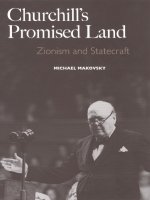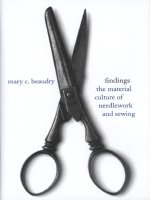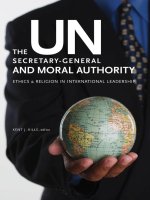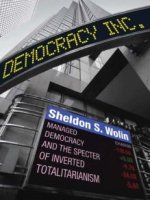yale university press churchills promised land zionism and statecraft aug 2007
Bạn đang xem bản rút gọn của tài liệu. Xem và tải ngay bản đầy đủ của tài liệu tại đây (1.22 MB, 367 trang )
churchill’s promised land
michael makovsky
Churchill’s
Promised Land
zionism and statecraft
a new republic book
yale university press new haven & london
Copyright © 2007 by Yale University.
All rights reserved.
This book may not be reproduced, in whole or in part, including illustrations, in any form
(beyond that copying permitted by Sections 107 and 108 of the U.S. Copyright Law and ex-
cept by reviewers for the public press), without written permission from the publishers.
Set in E & F Scala by Binghamton Valley Composition.
Printed in the United States of America.
Library of Congress Cataloging-in-Publication Data
Makovsky, Michael, 1963–
Churchill’s promised land : Zionism and statecraft / Michael Makovsky.
p. cm. — (A New Republic book)
Includes bibliographical references and index.
ISBN 978-0-300-11609-0 (cloth : alk. paper)
1. Churchill, Winston, Sir, 1874–1965. 2. Churchill, Winston, Sir, 1874–1965—Views on
Zionism. 3. Zionism—Great Britain—History—20th century. 4. Great Britain—
Foreign relations—Middle East. 5. Middle East—Foreign relations—Great Britain. I.
Title.
DA566.9.C5M24 2007
320.54095694—dc22
2007001336
A catalogue record for this book is available from the British Library.
The paper in this book meets the guidelines for permanence and durability of the Commit-
tee on Production Guidelines for Book Longevity of the Council on Library Resources.
10987654321
In loving memory of my mother, Nancy Elbaum Makovsky,
who instilled in me a love of life, and in loving admiration of my father,
Donald Makovsky, who inspired my passion for history and
world affairs
Preface ix
Acknowledgments xiii
Introduction 1
1. Churchill’s Worlds 9
2. “The Lord Deals with the Nations as the Nations Dealt
with the Jews,” 1874–1914 38
3. “Zionism versus Bolshevism,” 1914–1921 69
4. “Smiling Orchards,” 1921–1929 98
5. Together in the Wilderness, 1929–1939 140
6. Champion in War, 1939–1945 171
7. Zionist at the End, 1945–1955 227
Conclusion 259
Notes 267
Bibliography 299
Index 323
Illustrations follow page 110
viii contents
PREFACE
when virginia cowles told Winston Churchill in 1950 of her
plans to write a biography of him, he growled good-naturedly, “There’s
nothing much in that field left unploughed” (quoted in Cowles, Winston
Churchill, vii). This is not another biography of Churchill or even a study
of his diplomatic decision-making. Instead, it is an examination of how
he thought, viewed, and approached a diplomatic subject that engaged
him for much of his career, and what that signified about his worldview.
The subject in question was not just any normal world issue but Zion-
ism, a movement that emerged as a political cause in the late 1890s, just
as Churchill began his political career.
Churchill is perhaps most famous nowadays, at least in the United
States, for warning against the rise of Nazi Germany in the 1930s and
the Soviet Union in the 1940s, and for leading Britain to victory in the
Second World War. He is well known as a practitioner of realpolitik, and
many leading theorists and practitioners of the realist foreign policy
school, such as Hans Morgenthau and Henry Kissinger, have looked to
Churchill as a model. Indeed, Churchill was fundamentally concerned
with British power and security, and he advocated and pursued policies
that enhanced them, based on his own historical study of earlier British
and European statesmen. But he was a very complex person with varied
interests, who also had a romantic approach to foreign affairs. His view
ix
of the British Empire, and of Britain’s role in the world, was rather sen-
timental. Sentiment also played a part—positively and negatively—in
his opinion of other Great Powers, such as Russia, Germany, France,
and especially the United States, where his mother was born and grew
up, although his attitude toward these nations was ultimately shaped by
British power and strategic interests. But sentiment was the predominant
factor in his long-standing interest in Zionism, with considerations of
power at times important but generally secondary. Thus, in studying
Churchill’s view of Zionism, we get a different angle on, and a fuller,
more nuanced, multidimensional grasp of, his worldview than if we just
analyzed his approach toward a Great Power such as Germany, as so
many have done before from varying perspectives.
Fundamental to Churchill’s worldview was the belief that priorities
had to be rigidly ranked. He inflexibly maintained perspective and prior-
itized his goals, especially when he was in government and was forced to
make decisions. He fixated on his supreme interests and pursued them
vigorously and single-mindedly, though he was flexible in the tactics
used to achieve them. This is how he engaged British strategic and im-
perial matters and at times even his own political needs, which were
among his chief concerns. For instance, he normally studied strategic is-
sues very carefully, poring over intelligence reports, speaking with well-
placed sources, reading obscure books and speeches, and assessing
threats and possible allies, then produced prescient, analytical, lucid, of-
ten brilliant memos and speeches on these issues and, when in govern-
ment, actively pursued appropriate policies. The objective was self-
evident as was the need to subordinate other demands to it.
Churchill approached Zionism, and other lesser but still significant
issues, differently. His mood and actions toward Zionism were usually
shaped by his primary concerns, and he engaged it with less diligence,
consistency, rigorous thought and analysis, and creativity. The objective
here was not always apparent to all, and a myriad of complex considera-
tions—racial, ideological, civilizational, humanitarian, paternal, per-
sonal, historical, romantic, mystical, and religious—went into his view
of Zionism over time. Churchill liked to judge which events were histor-
ically significant and which were not, and both early in his career and
near the end of it he declared the restoration of a Jewish state in the
Promised Land to be of exceptional historical significance. Eventually,
x preface
Zionism became very dear to him and integral to his worldview, and he
supported it at great political cost, contributing to his unpopularity
among his colleagues and other members of the political and govern-
ment establishment.
I approach this subject not as a scholar of Zionist or Jewish history,
or even of Britain or the Middle East, but as a diplomatic historian fo-
cused on Churchill. With some exceptions, I have generally tried to fo-
cus on Churchill’s mind and not on his policy-making. I am interested
in policies only to the extent that they illuminate his thinking about
Zionism. I am more interested in how his mind characterized Zionism
and why, what the context of his thinking was, who or what influenced
him, and how much effort and attention he devoted to the issue, and am
less interested in the details of a particular policy or event that have been
discussed ably in other works. Indeed, I am strictly interested in how he
thought about Zionism, whether in policy form or not, whether in gov-
ernment or out. For that reason, I have tried to be as thematic as possible
within a given narrative, providing just sufficient background, as op-
posed to following a strict chronology that can be gleaned elsewhere.
preface xi
this book is based on several chapters of my doctoral dis-
sertation, Power and Civilization: Winston Churchill’s Worldview, and I ex-
tend my deep appreciation to Professors Bernard Bailyn, Akira Iriye, and
Ernest May, who composed my dissertation committee in the Depart-
ment of History at Harvard University. I am most grateful for their in-
sightful instruction, singular dedication, and encouragement, and I am
extremely fortunate and honored to be their student. Each of my profes-
sors made a unique contribution to me and my work. Akira Iriye, a
prominent diplomatic historian, guided me throughout my academic
studies; he was my advisor in college at the University of Chicago,
chaired my dissertation committee at Harvard, helped shape my disser-
tation, and reviewed a late draft of this book. Throughout all of these
roles, he showed unusual dedication and offered penetrating insight.
Ernest May, the leading U.S. diplomatic historian, always offered inci-
sive and uncommon guidance, including the suggestion to expand the
Zionist portions of my dissertation into a book. One of the highlights of
my education was the yearlong private course on Colonial American his-
tory that Bernard Bailyn kindly agreed to teach me for no academic
credit. Bailyn was also very engaging, encouraging, patient, and gener-
ous with his thoughts and advice during my doctoral studies and while I
xiii
wrote this book. Bailyn’s books and articles have served as model for me,
as they have for several generations of historians.
I am indebted to Chili Lati, my lovely, curious, and ever-patient wife,
whom I met and married early in the book-writing process and who put
up with its constant and at times seemingly unending demands. She
also reviewed several chapters and made many insightful comments. I
am very thankful to Aaron Lobel for his comprehensive, thoughtful, and
incisive critique of the manuscript, and to Michael Hurwitz for his de-
liberate and insightful review of the chapters, and steadfast and wise
counsel on various aspects of the book’s publication. David Bergman of-
fered many penetrating and subtle comments about the content, and
was a helpful sounding board. I am also grateful to David Makovsky for
his beneficial comments on some of the chapters, and to Rochy
Novoseller Duker for faithfully managing the maze of the Central Zion-
ist Archives in Jerusalem to secure many documents on my behalf. I fur-
ther benefited from Liz Evans’s conscientious research in the National
Archives in Kew, England, during the latter stages of this book. I am
grateful to my fellow Lincoln Fellows at Claremont Institute, who con-
tributed to the formulation of the book’s title. I am obliged to Douglas
Feith for his meticulous review of several relevant chapters of my disser-
tation and for the thought-provoking dialogue. Anyone who studies
Churchill is heavily indebted to the monumental effort made by Martin
Gilbert in making this very large subject more accessible through many
books that he wrote and edited. Gilbert also offered helpful advice early
in my doctoral studies.
I am very appreciative of Keith Condon, my editor at Yale University
Press, who wisely and patiently guided the book and me through the
whole publication process. Jessie Hunnicutt, my production editor, had
a keen and meticulous eye. I am also obliged to Larisa Heimert, the edi-
tor who initiated consideration of my manuscript at Yale University
Press before departing for another press.
I am indebted to Marty Peretz, editor-in-chief of the New Republic,
for his confidence, encouragement, and deep interest in my book, and
for the interest he has taken in me over the years. I am also thankful to
Roger Hertog, chairman of the New Republic, for the interest that he took
in me and the book.
I am grateful for the constant encouragement and astute advice of
xiv acknowledgments
Daniel Yergin and his wife, Angela Stent. I will always be indebted to
Alan Makovsky for his wise and conscientious guidance and encourage-
ment, and I am appreciative of Jay Freedman for being liberal with his
sage counsel.
I am very grateful to Irwin Stelzer and his wife, Cita, for their very
warm and generous guidance, assistance, and encouragement. For their
moral support, I wish to thank Jeff Kahana, Lyn Lustig, Winthrop Burr,
Larry Hartstein, Morris Hartstein, and Merrill Cohen. I will be forever
thankful to Judy Katz, who encouraged and helped me in my early aca-
demic career. I am obliged to Paul Jacob, the CEO of an energy-trading
company in Boston where I worked almost full-time while researching
and writing my doctoral dissertation and some of this book; he offered
uncommon understanding and support. I am very grateful to Jason
Grumet, executive director of the Bipartisan Policy Center, where I be-
gan to work at the latter stage of the drafting process; he was very en-
couraging and supportive.
Many dedicated librarians and archivists were especially helpful.
They include Walter Ross-O’Connor, Thomas Bahr, Paul Vermouth, and
the late Dave Paul at Harvard University, where the libraries and librari-
ans generally are in a class unto themselves; Margaret W. Ellingson at
Emory University; Julie Ash of the National Archives in Kew, England;
and Caroline Herbert of the Churchill Archives in Cambridge, England,
who reliably and cheerfully answered my numerous inquiries.
I will always remain heavily indebted to the late Karl Weintraub, the
inspirational and legendary intellectual historian at the University of
Chicago, who spent many hours giving me extra private instruction in
college and who ever since has served as a model intellectual, historian,
and teacher. I am also grateful for the confidence and moral support of
my late great-uncle, Walter Freedman, a standard-bearer of excellence in
every way, who at the age of eighty-six offered many useful comments
on my doctoral dissertation.
acknowledgments xv
Introduction
winston churchill came to consider himself a Zionist,
though he had trouble pinpointing the source of this development. In
1921, he traced it to contact with North-West Manchester Jews a dozen
years earlier, while in the 1950s he connected it with the Balfour Decla-
ration of 1917, which committed Britain to a Jewish homeland in Pales-
tine. At other times in the 1950s, he claimed to have been a Zionist his
entire life.
1
It was only natural for Churchill to be puzzled, because he
frequently conveyed conflicting and confusing messages about Zion-
ism. He advocated a Jewish homeland in 1906; extolled the virtues of a
Jewish political entity or state based in Jerusalem in 1908; implemented
the Balfour Declaration as colonial secretary in the early 1920s, which
ensured continued Jewish immigration and Zionist development in
Palestine; and publicly championed Zionism in the 1930s, earning a
reputation as one of the leading Gentile Zionists in England. As prime
minister during the Second World War, Churchill eagerly and confi-
dently battled the overwhelming majority of officials in his Conservative
Party and government bureaucracy who were unsympathetic to Jews and
Zionism, and he worked diligently but ultimately unsuccessfully to fash-
ion a postwar Middle Eastern settlement that included a Jewish state. He
also pushed for closer relations with the State of Israel from shortly after
its founding in 1948 through his second premiership in the 1950s. Yet,
2 introduction
he avoided contemplating or raising Jewish claims to Palestine when the
government—in which he held the senior post of first lord of the Admi-
ralty—deliberated a postwar Middle East in 1915, neither said nor wrote
anything about the Balfour Declaration when it was issued in 1917 by a
government in which he was a mid-level minister of munitions, dispar-
aged the Zionist movement in the late 1910s and early 1920s, commit-
ted 75 percent of Palestine to an Arabian prince in 1921 as colonial sec-
retary without even consulting the Zionists, did little to help Jewish
settlement in Palestine in the economically depressed late 1920s when
he was chancellor of the exchequer, and virtually abandoned the Zionists
following the Second World War as head of the political Opposition
when they battled British troops and invading Arab armies in their ardu-
ous quest for an independent state.
Churchill’s opinion of Zionism evolved, albeit in a nonlinear fash-
ion. He was predisposed to support Zionism when he first confronted it
while campaigning for office in 1905 in North-West Manchester, a com-
mercial city with a sizable Jewish population. He was naturally philo-
Semitic, personally comfortable with Jews, and sympathetic to their
causes, following the instincts and practices of his father, Randolph. He
respected the Jewish race, religion, role in history, fortitude, and alleged
political power in Britain and the United States. He thought it important
to be good to the Jews and took to heart an adage he periodically quoted
and attributed to Benjamin Disraeli, the Jewish-born nineteenth-century
British prime minister who influenced Randolph: “The Lord deals with
the nations as the nations dealt with the Jews.” Still, Churchill some-
times patronized Jews and, like his father, manipulated their causes on
behalf of more important personal and strategic considerations and ob-
jectives.
Churchill did not share the common European view in the nine-
teenth and early twentieth century of a “Jewish problem,” which held
that the Jews, a rootless quasi-nation spread across the globe, were
racially inferior, devoted to a noxious religion, socially estranged and a
source of social and political turmoil. Even many Jews shared this view,
or at least parts of it, while many other Jews adamantly rejected it. Zion-
ists renounced Diaspora Jewry and believed that by establishing their
own state in Palestine and joining the ranks of the other nations of the
world, the Jews would “normalize” and thereby help stabilize European
introduction 3
nations. Theodor Herzl, one of the early founders of political Zionism in
the late nineteenth century and the person who put the issue on the in-
ternational diplomatic map, was among those who employed this argu-
ment to enlist Gentile support for the Zionist dream. The closest
Churchill came to perceiving a “Jewish problem” was in the highly
charged anti-Semitic environment of the late 1910s and early 1920s,
when he was vexed over the disproportionate number of Jews in Com-
munist movements. He certainly was not concerned about Jews in Eng-
land; he never saw them as troublemakers, competitors for jobs, or diffi-
cult to integrate into society, as even some other Gentile Zionists did.
But neither did he regard Zionism, as Herzl did, as an existential neces-
sity for the Jewish people; he had far too much faith in European civi-
lization and mysterious Jewish fortitude. He also never saw Zionism as
a normal nationalist movement, as Herzl somewhat did, but one that
stood for particularly lofty ideals—a view shared by socialist, cultural,
and religious Zionists.
Churchill considered Zionism to be not a corrective for current soci-
etal ills or an existential necessity for Jews but a rectification of a histori-
cal injury and a positive force for the present and future. He felt this way
upon first engaging the issue in 1906–1908, when he also ascribed
some possible British imperial value to it. But it remained a somewhat
vague concept for him, as the new movement was even for many Jews.
While serving as colonial secretary in 1921–1922, Churchill immersed
himself in many of the relevant issues, visited Palestine, and met Pales-
tinian Arabs and Jews, which led to a fuller and deeper understanding of
the issue. He came to see Zionism as a cause that restored dispersed,
persecuted Jews, a great ancient race whose heritage was integral to the
foundation of Western civilization, to their historic homeland, where
they could observe their traditions and civilize an area left barren by
primitive, anti-British Arabs. He did not immediately come to this for-
mulation, which largely matched the Zionist movement’s, nor did he
ever articulate it so cogently. During the 1930s and 1940s, with the rise
of Nazism, the Second World War, the Holocaust, and his own political
“wilderness years” and then ascension to prime minister, Churchill also
attributed urgent humanitarian and strategic value to Zionism and came
to identify personally and ideologically with the Zionists and Jews, shar-
ing common friends and foes.
4 introduction
Although Churchill’s notion of Zionism evolved, his perception of
the Zionist political movement remained generally static. The liberal,
moderate, dignified, upright, bourgeois, and even romantic image that
Herzl fashioned at the First Zionist Conference in Basle in 1897, which
was perpetuated and reinforced by subsequent Zionist leaders, was the
picture Churchill almost always conjured in his mind when he thought
of Zionism. His contact and friendship with Chaim Weizmann espe-
cially endeared him to the Zionist cause. Weizmann, a contemporary,
was a magnetic, charming immigrant who shared Churchill’s romantic
image of England, nineteenth-century liberal English values, and burn-
ing desire to advance the cause of civilization, like many other Russian-
born Jews of that generation did.
2
Rishon Lezion, a beautiful early pio-
neering settlement filled with dedicated Jewish laborers who successfully
cultivated a barren wilderness, became the permanent face of Jewish
Palestine/Israel following Churchill’s sole extended visit there in 1921.
Given Zionism’s subordinate importance in his worldview, Churchill
never became an expert on Zionism or Palestine, never met or men-
tioned Herzl, and never developed a deep understanding of the move-
ment or the many practical difficulties it faced. With few exceptions
Churchill did not originate ideas relating to Zionist policies; instead,
he reacted to proposals made by others. He rarely if at all encountered
or interacted with Arabs or Muslims in England growing up, but he
took a very dim view of them in his youthful years as a soldier, which
he generally maintained for the rest of his life. That view was rein-
forced after his extensive contact with them in 1921 as colonial secre-
tary. He forever saw the Palestinian Arabs as intransigent, backward,
and anti-British.
One of the most intriguing fixed images in Churchill’s mind was
that of the Zionists as civilizers. He shared the view of many nineteenth-
century British writers and public figures that restoring the Jews to
Palestine would benefit the world. Many of these thinkers were evangel-
ical Christians who believed restoration would spur the Second Coming
of Christ, but he perceived the global benefit in broadly secular terms:
the physical and moral advance of civilization. This was not very differ-
ent from Herzl’s argument that Jewish restoration would benefit the
world by bringing stability to Europe and creating a liberal bastion in the
Middle East. Other Gentile Zionists shared this view as well. Initially
introduction 5
Churchill viewed the Zionists as potential colonists on behalf of the
British Empire, but this idea did not linger long; even after Britain took
on the League of Nations mandate he never viewed Palestine as part of
the empire (and it technically was not). The interest the Zionists served
was not that of the British Empire but of Western civilization as a whole.
This was a fine but significant distinction. So powerful was the civiliza-
tional argument for Churchill that to him it overrode whatever historical
claims a people might have. Any group that did not properly develop
land; advance science, literature, or philosophy; or introduce liberal
laws, culture, and institutions on their land—in other words, contribute
to the progress of civilization—in effect mortgaged their right to that
land. Perhaps this argument too had a loosely religious basis, a secular
equivalent of the biblical injunction in Leviticus that God expelled na-
tions from the Holy Land that did not live there morally. In the case of
the Jews, Churchill believed they had in their favor both the civilizational
and the historical arguments. He retained an abundant curiosity about
the land of Palestine and its development, at times inquiring about the
minutest agricultural matters. He saw the Zionists as kindred civilizers
who, as he declared as late as 1949, managed to “bring back into eco-
nomic usefulness lands which the world cannot afford to leave lying
idle.” Throughout his whole life he believed every land across the globe
had to be properly developed in order to nourish people and advance the
cause of civilization. As early as 1908 he pronounced in a travelogue
about Africa that everyone—no matter his or her race—had an obliga-
tion to civilize the world and contribute to its progress: “No man has a
right to be idle, whoever he be or wherever he lives. He is bound to go
forward and take an honest share in the general work of the world.”
3
Churchill believed the Zionists fulfilled this mission as the British and
other allegedly advanced white races had.
To appreciate fully the romantic and prescient nature of Churchill’s
Zionism, it must be understood that there was nothing inevitable about
the establishment of the State of Israel in 1948. A half century earlier the
nascent Zionist movement appeared to most Jews and Gentiles to be ab-
sorbed in a fantasy. Who would have thought realistically that a people
scattered for almost two thousand years around the globe, persecuted in
virtually every single locale in which they lived, would return to the land
from which they had originated and where they had lived as a nation
6 introduction
before their defeat and exile by the ancient Romans? Churchill predicted
such an eventuality with confidence in 1908 and felt it even more likely
beginning in the 1920s. But few outside the Zionist leadership regarded
Churchill’s Zionism, when he expressed it, as being on the right side of
history. This was especially true early on, but it remained true as late as
the early 1940s, when millions of Jews were being murdered in Hitler’s
ovens. Who also would have believed that the Jews, who for centuries
were denigrated and degraded in practically every European state for al-
legedly possessing negative racial and personality traits and nefarious
social, economic, and political designs, would become one of the chief
promoters of nineteenth-century liberalism in the darkened first half of
the twentieth century, marked by Communism and Nazism? Churchill
was one of the few who instinctively grasped that early on. And, finally,
who would have imagined that the Jews, who for centuries were banned
from various professions and virtually forced into financial and mercan-
tile fields, would become expert agriculturalists and make the desert
bloom? Churchill ascertained this when he visited Palestine in 1921.
Churchill, with a nimble and nuanced mind, stood out for all these
imaginative insights and others, not only amid the overwhelming ma-
jority of Gentiles but amid many Jews as well. As one Anglo-Jewish
leader and well-known writer, Israel Zangwill, observed in 1905, “For
Mr. Winston Churchill, unlike alas! So many of our own leaders has
shown himself possessed of that quality of political imagination which
does not call visions unreal because they are not yet solid, which under-
stands the creative force of great ideas.”
4
A further improbability in this tale is that Britain was an essential
agent in the founding of the Jewish state. The Britain in which Churchill
was born in 1874 had a very mixed historical record in its treatment of
Jews and Zionism. It was the scene of one of the most bloody anti-
Semitic massacres in the Middle Ages, the first European country to
charge Jews with ritual murder, and the first to expel them en masse. Yet,
by the late nineteenth century, Britain had granted full political rights to
the Jews, had a Jewish-born prime minister, and offered asylum to east-
ern European Jewish refugees fleeing persecution. Also, in the mid-
nineteenth century an evangelical movement grew that supported a Jew-
ish entity in the Holy Land. In the early twentieth century, Britain issued
the Balfour Declaration, which helped lead to the founding of the State
introduction 7
of Israel in 1948, although by that point Britain virulently opposed what
it had helped instigate.
Despite Churchill’s predisposition and overall support for Zionism,
his trajectory on the issue was erratic. He was at various times moder-
ately supportive, ardently supportive, opposed, and indifferent. This in-
consistent attitude can be more fully comprehended through an under-
standing of his worldview. Ultimately, he was dedicated to the
advancement of civilization, by which he meant what we would refer to
today as the “Western” way of life—such as its values, customs, laws,
and economic system. Since he considered Britain and its empire the
chief champions of civilization, he fixated on British strategic and impe-
rial interests. And as an ambitious politician who sought to be in Parlia-
ment and high government office to influence policy and events, he fo-
cused greatly on his political needs as well. These paramount issues, and
sometimes others, mostly, though not always, determined Churchill’s
mood toward Zionism, even if they did not usually affect how he gen-
uinely felt about it. This was because Zionism was for him a subordinate
issue—a predominantly romantic and sentimental cause that had no di-
rect impact on British survival or power and only intermittent bearing
on British strategic or imperial interests.
The larger issues generally favored Zionism early in Churchill’s ca-
reer; he saw imperial benefits to Zionism and personal political advan-
tage in pursuing it, but his attachment to the cause was weak. In the
1910s and 1920s, strategic, imperial, and political factors all led him to
ignore Zionism and resent it. Still, in 1921, he began to understand the
issue more fully and came to embrace it, particularly for civilizational
reasons. From the late 1920s until the end of the Second World War, the
preeminent issues—except politics—were aligned, as were ideological,
humanitarian, and personal considerations. Churchill felt a deep identi-
fication with the Zionists during this time, and he championed their
movement. In the 1930s, during his years in the political wilderness, his
Zionism solidified and he became known as one of Britain’s leading
Gentile Zionists. From 1945 through 1948, the wider picture was hazy
and conflicting, and for personal, political, and psychological reasons he
ignored Zionism even though it tugged on his conscience. He reverted
back to supporting Zionism from 1949 until the end of his political
career.
8 introduction
With a few notable exceptions, such as the early days in Manchester,
politics generally did not favor support for Zionism, and mostly
Churchill’s views toward Zionism were markedly out of sync with general
public opinion. Often, therefore, his public remarks about Zionism, and
even sometimes his private ones, were very much geared to his audi-
ence, with his intentions often hidden. This stood in contrast to his com-
ments about Russia or other grave strategic matters about which he
cared more deeply and on which he generally did not compromise for
political expediency. As an ambitious politician, particularly in his early
years, and a great rhetorician, Churchill excelled in fitting an argument
to an objective, and never more so than he did regarding the politically
controversial Zionist movement.
And yet, however often Churchill’s primary concerns interfered
with support for Zionism, especially early in his career, his other more
sentimental interests—including religious, racial, historical, humanitar-
ian, familial, personal, mystical, and civilizational—as well as his ideo-
logical interests drew him to it. The Zionist movement, which appeared
so far-fetched early in his career and became so unpopular in England
later in his career, captured his imagination and became integral to his
worldview.









